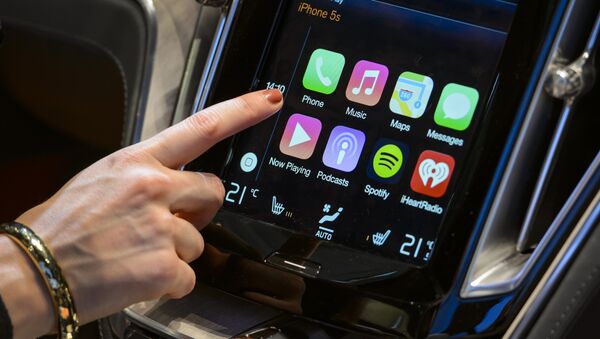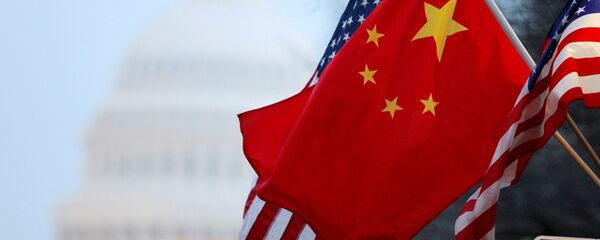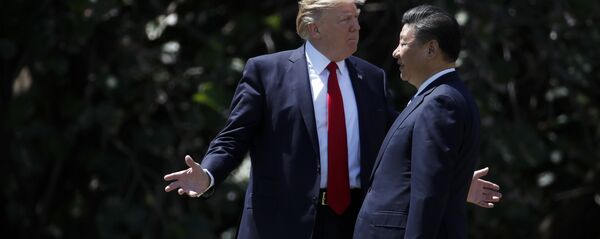Radio Sputnik talked about the possible impact of President Trump's trade fight on US tech giants with Daniel Ives, chief strategy officer and head of technology research at GBH Insights.
Sputnik: How nervous are the tech giants about the consequences, this fallout from Donald Trump's trade war with China?
Daniel Ives: You've seen with Tim Cook and Apple in front and center as really understanding some of the ramifications. There's no doubt that Apple is in its own category because of how much sales come out of China as well as the Foxconn facility and a lot of the production of the iPhone.
I think what's going to happen is across the valley, there are lingering worries now, not just some chip makers, but when you look at traditional tech giants, it's because they buy a lot of optical fiber networking in terms of these buildouts.
READ MORE: China's Giant Wind Turbine Producer Fined Over US Exclusive Technology Theft
The worry is not just in from the cost perspective, but does it disrupt the supply chain? So these are not just the unintended consequences here; there's a ripple effect. I think you're starting to see Silicon Valley go from background noise to becoming a little more clear in terms of the impact. I think this is something investors are focused on too if the trade war continues to heat up.
Sputnik: Can we talk in greater detail about exactly what tech companies and industries could be affected the most by the new tariffs?
Daniel Ives: Most definitely, depending on the path, are chip companies. If you think about it from a chip manufacturer perspective, this isn't just going to increase the cost throughout the whole supply chain, but it could disrupt the supply chain. And I think that's a worry for chip companies at the moment. That's from for Intel to AMD to NVidia and then you look at Broadcom and Qualcomm and really a whole food chain of suppliers that could be impacted there.
READ MORE: Cover Your Tracks: Apple Internal Memo About Leaks Gets Leaked
I think the next one is Apple, kind of front and center, because so much of demand, let's call it 15-20% of iPhones coming out of China from the production standpoint there is one thing, but 15-20% of iPhones sold are coming out of China.
Sputnik: How hard is the consumer going to be hit?
Daniel Ives: I can tell you from an Amazon perspective. Amazon will just pass the incremental cost onto the consumer. Ultimately these companies are going to pass the cost on, ultimately it is the consumer that will mostly bear it; from electronics to consumer staples and obviously even in other areas.
I think the worry, especially from the electronics perspective, from the chip perspective if the components are more expensive that go into smartphones, TVs, computers, those companies aren't going to absorb the cost; it ultimately goes to the consumer.
READ MORE: ‘I Can't Trust It': Unbidden, Amazon Alexa Records Owner, Sends Chat to Friend
That's the broader worry here. We understand that it's a political trade war, but if the consumer gets hurt and it starts to impact US tech companies and investors start to become more focused on this — which they are, then it's due to become a brush fire situation.
Sputnik: It's going to be certainly more than the ripple effect; but you just said that chip companies top the list and, of course, immediately what comes to mind are national security interests. How much of a national security problem could it become for the US?
Daniel Ives: I don't think that's really a worry because with the national security issue that can be used more about 5g. Obviously, we see the GTE Huawei it speaks to the Broadcom and Qualcomm deal that got shut down. So I don't feel there's much of a national security threat.
Sputnik: You mentioned investors and of course we had some guests this past month who were talking about the trade war and they were all saying that investors are going to pull back, that they are going to wait. Do you see that happening?
Daniel Ives: I believe investors realize this is a poker game going on in terms of the negotiations perspective. And I think the [Wall] Street has become more into it in terms of the way Trump negotiates through the media. And ultimately if you look at the impact I think the bark is going to be worse than the bite in terms of how bad this trade war gets. That's what the [Wall] Street is basically saying right now.
READ MORE: US Investor on Future of Creativity: Soon We'll Bе Buying 'AI Robot's Albums'
So I think it is one where we continuously pull back here on the trade war worries. I think so far it's still a very containable amount that would really be put into the tech system, so I think investors aren't overly worried today but it's a concern and the more heated this becomes, more tit-for-tat then the problem will become more real. I think that's the focus but as of now, I do believe it's a little more containable which is why they shouldn't be as worried.
The views expressed in this article are solely those of the speaker and do not necessarily reflect those of Sputnik.





